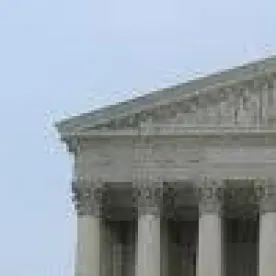In a decision certain to have significant impact on Telephone Consumer Protection Act (TCPA) class action litigation, today the U.S. Supreme Court concluded narrowly that to qualify as an “automatic telephone dialing system”, a device must be able to either “store a telephone number using a random or sequential generator or to produce a telephone number using a random or sequential number generator”. The underlying decision of the Ninth Circuit is reversed and remanding.
Back in July of 2020, the Supreme Court accepted writ of certiorari to review a Ninth Circuit ruling regarding the TCPA addressing the issue of whether the definition of ATDS in the statute encompasses any device that can “store” and “automatically dial” telephone numbers, even if the device does not “us[e] a random or sequential number generator.” The Ninth Circuit had taken a broad approach to this issue, concluding that “an ATDS need not be able to use a random or sequential generator to store numbers[.]” The Ninth Circuit court explained that “it suffices to merely have the capacity to ‘store numbers to be called’ and ‘to dial such numbers automatically.’”
ATDS Circuit Split
When the TCPA was enacted in 1991, most American consumers were using landline phones, and Congress could not begin to contemplate the evolution of the mobile phone. The TCPA defines “Automatic Telephone Dialing System” (ATDS) as “equipment which has the capacity—(A) to store or produce telephone numbers to be called, using a random or sequential number generator; and (B) to dial such numbers.” 47 U.S.C § 227(a)(1). In 2015, the Federal Communications Commission (FCC) issued its 2015 Declaratory Ruling & Order (2015 Order), concerning clarifications on the TCPA for the mobile era, including the definition of ATDS and what devices qualify. The 2015 Order only complicated matters further, providing an expansive interpretation for what constitutes an ATDS, and sparking a surge of TCPA lawsuits in recent years.
Consequently, several FCC-regulated entities appealed the 2015 FCC Order to the D.C. Circuit Court of Appeals, in ACA International v. FCC, No. 15-1211, Doc. No. 1722606 (D.C. Cir. Mar. 16, 2018). The D.C. Court concluded the FCC’s opinion that all equipment that has the potential capacity for autodialing is subject to the TCPA, is too broad. Although the FCC did say in its 2015 Order “there must be more than a theoretical potential that the equipment could be modified to satisfy the ‘autodialer’ definition”, the Court held that this “ostensible limitation affords no ground for distinguishing between a smartphone and a Firefox browser”. The Court determined that the FCC’s interpretation of ATDS was “an unreasonably expansive interpretation of the statute”.
Since the decision in ACA Int’l, courts have weighed in on the D.C. Circuit Court ruling and the status of the 2015 Order, sparking a circuit split over what constitutes an ATDS. The Second and Ninth Circuit have both broadly interpreted the definition of an ATDS, while the Third, Seventh and Eleventh have taken a much narrower reading. For example, earlier this year the Eleventh and Seventh Circuit Courts reached similar conclusions, back-to-back, narrowly holding that the TCPA’s definition of Automatic Telephone Dialing System (ATDS) only includes equipment that is capable of storing or producing numbers using a “random or sequential” number generator, excluding most “smartphone age” dialers.
Supreme Court Decision
The Supreme Court unanimously concluded, in a decision written by Justice Sotomayor, that to qualify as an “automatic telephone dialing system” under the TCPA, a device must have the capacity either to store, or to produce, a telephone number using a random or sequential number generator.
“Expanding the definition of an autodialer to encompass any equipment that merely stores and dials telephone numbers would take a chainsaw to these nuanced problems when Congress meant to use a scalpel,” Justice Sotomayor pointed out in rejecting the Ninth Circuit’s broad interpretation of the law.
Moreover, Sotomayor noted that, “[t]he statutory context confirms that the autodialer definition excludes equipment that does not “us[e] a random or sequential number generator.”” The TCPA’s restrictions on the use of autodialers include, using an autodialer to call certain “emergency telephone lines” and lines “for which the called party is charged for the call”. The TCPA also prohibits the use of an autodialer “in such a way that two or more telephone lines of a multiline business are engaged simultaneously.” The Court narrowly concluded that “these prohibitions target a unique type of telemarketing equipment that risks dialing emergency lines randomly or tying up all the sequentially numbered lines at a single entity.”
Take Away
The Supreme Court’s decision should help resolve the ATDS circuit split and provide greater clarity and certainty for parties facing TCPA class action litigation. And while this decision is considered a win for defendants facing TCPA litigation, organizations are advised to review and update their telemarketing and/or automatic dialing practices to ensure TCPA compliance.





 />i
/>i
